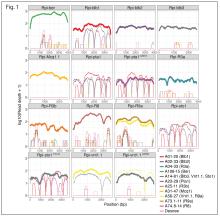
The potato genome sequence derived from the Solanum tuberosum Group Phureja clone DM1-3 516 R44 provides unparalleled insight into the genome composition and organisation of this important crop [The Potato Genome Sequencing Consortium 2011]. Based on the availability of this genome, we have developed target enrichment sequencing platforms such as whole exome capture, Generic enrichment Sequencing (GenSeq) [Chen et al., 2018], and Resistance gene enrichment Sequencing (RenSeq) [Jupe et al., 2013]. The read coverage achieved through these enrichment platforms enable high-confidence SNP calling for the mapping of diverse traits.
Furthermore, a diagnostic form of RenSeq, referred to as dRenSeq, is used to ascertain, with high confidence, if disease resistance in wild species [Van Weymers et al., 2016] or tetraploid cultivars [Armstrong et al., 2018] are based on previously characterised resistance genes. Therefore, dRenSeq provides a means to quickly prioritise novel resistances for genetic studies and to assist breeding efforts that aim to stack functional resistance genes.
In addition, using microarray expression analysis, we generated a comprehensive transcriptional reference map of the early potato responses to defence hormones [Wiesel et al., 2015]. We studied the specific effects to exogenous application of abscisic acid, brassinolides (applied as epibrassinolide), ethylene (applied as the ethylene precursor aminocyclopropanecarboxylic acid), salicylic acid and jasmonic acid (applied as methyl jasmonate).
To find out more, please visit the following pages:

